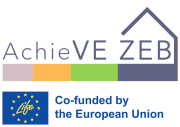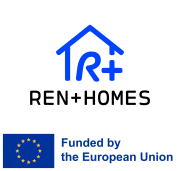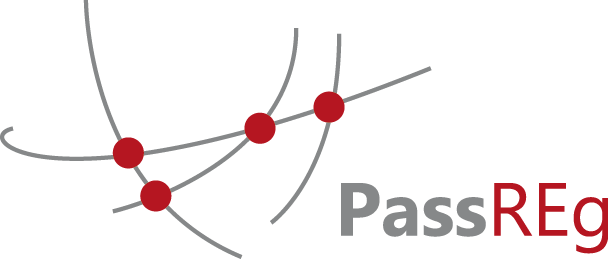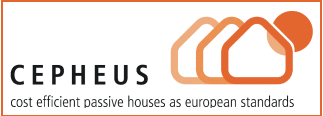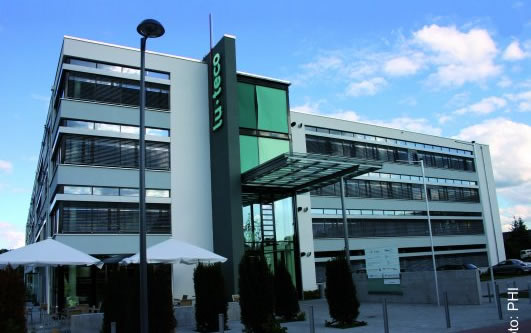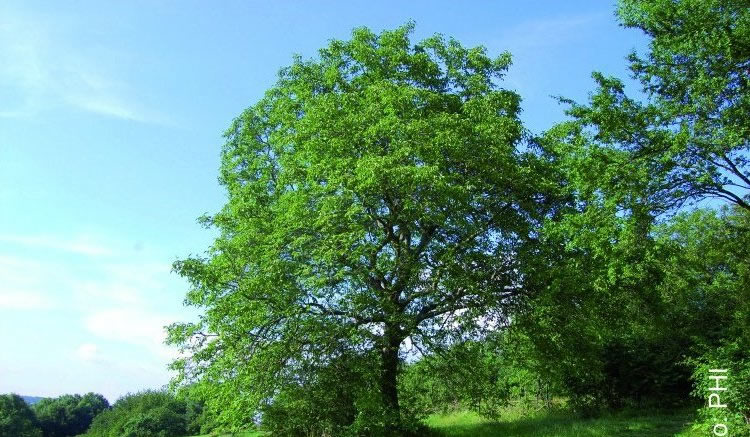References
EU-Projects
Over a project period of 3 years, AchieVE-ZEBsupports the objectives of the Zero Emission Buildings Directive under the EU Green Deal by improving expertise in areas such as phased renovation, energy efficient heating, modular renovation elements, summer comfort, circular economy and life cycle assessment. A consortium of leading institutions is developing or updating training materials for energy consultants, planners, project developers and building professionals in Austria and Germany. The project ensures its sustainability through approved curricula, communication, training of trainers and English translations. Networks and stakeholders are actively involved in the replication strategy. |
The RENplusHOMES project, which started in June 2023, aims to develop a universal methodology for plus-energy houses and districts, which should contain widely reproducible technologies and integrated software solutions. In this context, two new buildings and two modernizations of old buildings are being realized in four EU countries under different climatic conditions. The Passive House Institute makes its many years of positive experience with Passive Houses available to the project. During this period, PHI will be dedicated to shower water heat recovery and primary energy renewable (PER) |
The new EU project outPHIt was launched in September 2020. outPHit is about faster, cheaper and more reliable energy-efficient retrofits. The refurbishments are to be implemented quickly and well prepared, e.g. through a high degree of prefabrication in serial refurbishment or with one-stop store concepts, in which the various tradesmen's services are offered as a complete package from a single source. In order to enable successful modernization with maximum energy efficiency, the EnerPHit standard, the Passive House Standard for refurbishments, is being targeted. The Passive House Institute is coordinating this new EU project. |
AZEB aims to achieve significant construction and lifecycle cost reductions of new NZEB’s through integral process optimization in all construction phases. AZEB means Affordable Zero Energy Buildings. This EU project will create a common methodology for cost effective NZEB and pave the way for innovation. In the 30-month project 8 partners from Italy, Spain, Bulgaria, Germany, France and The Netherlands work together till end 2019. The main steps of the AZEB project are to evaluate available experience and solutions to create a common methodology for cost reduction, apply the methodology to demonstration projects, finalise the methodology including lessons learned and disseminate the results. |
As of January 2015 the Passive House Institute is part of the Horizon 2020 EU-funded project Built2Spec which stands for "Built to specifications" and aims to facilitate construction practices. In order to achieve this ambitious objective, new self-inspection technologies based on Building Information Modelling (BIM) and portable devices will be developed for on-the-fly analysis, quality checks and direct data transfer, for example smartphone integrated 3D capture functions, infrared camera, embedded sensors for acoustic and indoor air quality tests. The Passive House Institute brings to the project its expertise in highly energy efficient construction and quality assurance. It also provides interfaces between the BIM-based platform and the planning and design tools PHPP and designPH. |
. |
In the EU-funded project known as Sinfonia, the Passive House Institute is taking a leading role in providing consultancy on as well as the certification of retrofit projects in the cities of Innsbruck (Austria) and Bolzano (Italy). PHI is also charged with the development and implementation of a monitoring concept to demonstrate actual energy savings from retrofitting measures in roughly 500 apartments across both cities. The project itself further deals with the topics of electricity efficiency and the assessment of energy savings potentials at the city district level. Sinfonia's findings will be transformed into concrete, sustainable energy development plans with the aid of the participating early adopter cities of
Paphos (Cyprus), La Rochelle (France), Rosenheim (Germany), Seville (Spain),
and Boras (Sweden). These early adopters will then integrate the plans into their municipal retrofitting strategies. |
.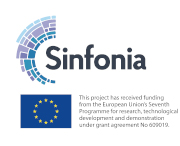 |
The "Train-to-NZEB" project aims to provide world-class training on energy efficiency and RES in buildings, based on new training programmes, business plans and up-to-date training equipment for a set of training and consultation centers (Building Knowledge Hubs) around Europe. |
PHI coordinated the IEE funded |
The Passive House Institute (PHI) has been significantly involved in European Union projects within the framework of the Intelligent Energy Europe Programme over the years, including |
Passive House Institute's first EU project, |
Further Project Participations
.The project „InSitu verification procedure“ is integrated in the international IEA EBC Annex 71 „Building Energy Performance Assessment Based on In-situ Measurements“ project and is funded by the BMWi. This is a follow-up project of the project „InSitu testing procedure“, which was integrated in the international Annex 58. In conjunction with the project partners Fraunhofer Institute for Building Physics, University of Rosenheim, Thermokon Sensortechnik GmbH und EnOcean GmbH, a method for determining the energy efficiency of a building is to be develped. The Passive House Institute intends to investigate the separability of the main influencing factors (building envelope, building services and users) on the energy consumption of buildings from collected measurement data. The aim is to be able to analyze the causes of possible differences between demand calculation and the consumption and to allocate them accordingly. For this purpose, detailed monitoring investigations are carried out on real buildings. |
Consultancy
In addition to its other work, PHI has carried out the building physics consultancy and scientific monitoring for the first Passive House |
International Passive House Conference
Since 1996, the Passive House Institute has organised the annual |
German Environmental Award
In 2001, Wolfgang Feist, founder and head of the Passive House Institute, was awarded the German Environmental Award by the German Environmental Foundation for his work on the development of the Passive House concept. In 2003, the Gothenburg International Environment Prize was jointly awarded to Wolfgang Feist and Swedish architect Hans Eek for their “pioneering work on Passive Houses which contributes to a great reduction in the consumption of fossil fuels and the emission of carbon dioxide.” |
| Next Courses |
PHPP Expert
Passive House Designer / Consultant
Construction Verifier
Site Supervisor
![]() read more
read more
e-learning
| Events |
iPHA Webinar "Project Spotlight: The CLT 8-floor ANMF hotel in Melbourne, Australia with heritage overlay." | November 12, 2025
![]() read more
read more
![]() Passive House Open Days |
Passive House Open Days |
7 - 9 November 2025
![]() read more
read more
![]() 24 - 25 April 2026, Essen, Germany
24 - 25 April 2026, Essen, Germany
![]() read more
read more
| Component Database |
 Passive House
Passive House
Component Database
read more
| Projects |
| New developments |
![]() designPH
designPH
read more
![]() NEW: PHPP 10 (2021)
NEW: PHPP 10 (2021)
read more
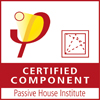 Seals for Certified Passive House Components
Seals for Certified Passive House Components
read more
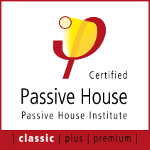 Passive House Classes,
Passive House Classes,
Classic, Plus, Premium
read more
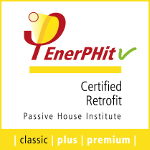 EnerPHit -
EnerPHit -
PHI certification for retrofits
read more
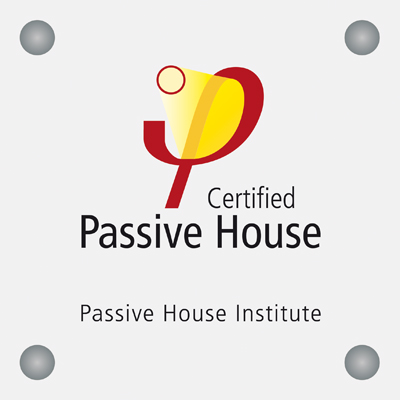 Wall plaque
Wall plaque
for certified Passive Houses
read more
| Press releases |
| Research & Literature |
![]() Passive Houses for different climate zones
Passive Houses for different climate zones
more
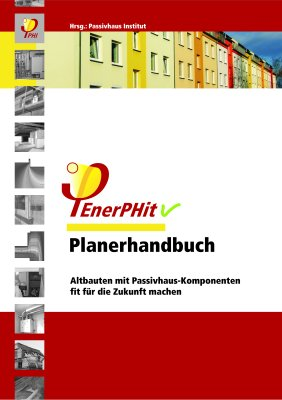 Retrofits with Passive House components -
Retrofits with Passive House components -
EnerPHit Planner Handbook
(in German)
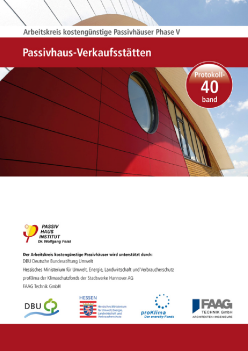 Passive House Retail Stores now out
Passive House Retail Stores now out
Overview of contents
(in German)

